London Journal, Part I
Observations, photos, feelings
I have a habit—not a bad one, for a change: Before traveling to a place, I listen to music from that place, or about it, maybe. I have traveled to London often over the years. (“He who is tired of London is tired of life”—Samuel Johnson.) Before setting off, I have a tradition of listening to the Cockaigne Overture and A London Symphony.
The formal title of the overture is “Cockaigne (In London Town).” What does that strange word mean? I will quote Wikipedia, Source of All Knowledge: “‘Cockaigne’ was a term used by moralists at that time as a metaphor for gluttony and drunkenness, while Britain adopted the name humorously for London.”
This work is by Elgar, composed in about 1900.
As for A London Symphony, it was composed by Vaughan Williams—Ralph Vaughan Williams—in the mid-1910s.
The desire to depict London—in art, music, and literature—is untiring.
***
I have heard tales of foreigners coming to the United States and having a terrible, terrible time at the airport—at Immigration. I feel almost guilty, about the ease with which I have flitted into Britain in recent years.
In the old days—like, the 20th century—I waited in long, long lines at Heathrow Airport. This morning? Well, there are maybe four people in front of me. Then I look into the camera and smile. (Not sure about the smile.) The whole thing takes about a minute and a half.
Frankly, I sort of miss talking to an Immigration officer. Such talks were usually pleasant, and one of them was useful in my journalism. (It gave me the opening of an article.)
Today, I have landed at 9:08. I don’t mean that the plane reached the gate at 9:08. No, the wheels touched down at 9:08. Do you know—swear—that I’m at Paddington Station, in Central London, at 10:02? Swear.
***
On my visits to London, I am almost killed, several times, the first day or two. I am almost clobbered by a car.
Walking around, I am completely unused to looking left, instead of right, and right, instead of left. My whole world is oriented to cars driving on the right side of the road.
Helpfully, the Londoners have words on the pavement, at intersections: “Look Left,” “Look Right.” I try to be mindful. I eventually figure it’s safest, however, to put one’s head on a swivel: to look around like crazy—left and right, front and behind—before proceeding.
Does anyone still use “head on a swivel”? This was once a common enough term. (“Man, you should have seen the girls there. My head was on a swivel!”)
***
In London, I always see lots of school uniforms—children and youths in school uniforms. I like it, a lot. These uniforms breathe civilization, to me. Mind you, I myself would have chafed at being put in a uniform. But I like it for others.
Am I hypocritical? No, I don’t think so, but maybe. (I like for others to eat beets, Brussels sprouts, and lima beans, too.)
***
I should pause for a language note: I have written “Brussels sprouts,” sort of honoring the Belgian capital with a capital letter. But I have written “lima beans,” not honoring the Peruvian capital with a capital letter. Why have I done that? Why the inconsistency?
I’m not really sure. I think, simply, that I grew up seeing “Brussels sprouts” and “lima beans.”
***
On a London street, a man wears a T-shirt that says, “People? Not a big fan.” (That is the opposite of “Up with People,” which was, or is, the name of a performing organization, once fairly well-known.)
***
I’ve snapped this picture not because the store is especially attractive or interesting but because it says to me, “England”—something about the lettering; something about the ampersand and the rendering of “Co.”:
The whole thing just says to me: “England.”
***
Here is another store—very familiar to us Americans:
Hang on: The sign says “TK Maxx” instead of “TJ Maxx.” What gives? Again, I turn to the Source of All Knowledge, Wikipedia: TK Maxx “is owned by American retailer TJ Maxx, who could not trade under the initials ‘TJ’ in the United Kingdom due to the British discount chain T. J. Hughes.”
Ah.
***
Whenever I see the Round Pond, in Kensington Gardens, I think of Paul Johnson: It was his favorite spot in town. He wrote a memorable essay about the pond in 2007, here. (I once read it—re-read it—while standing next to the pond itself.)
***
Walking through another park, Holland, minding my own business, I hear opera: Lucia di Lammermoor (Donizetti). What the ...? Then I remember that Holland Park has an opera company. They are rehearsing.
Very nice, of a summer day.
***
Is there any permanence in this world, whose hallmark is ephemerality? Well, look at what this place calls itself, in the upper left:
***
A stirring monument, in our time, “erected by Ukrainians in Great Britain in 1988”—three years before independence:
There are people who will tell you, with every other breath, that Ukraine is not a nation. Don’t believe them. The Ukrainians put the lie to it every day.
***
Well, this is more mundane than stirring, but it is a little interesting:
What do they sell? Well, lots of breakfast cereal, for one thing—cereal of the kinds we Americans know and love ...
***
Back to Kensington Gardens for a minute: Here is a shot of the Albert Memorial, with the concert house—Royal Albert Hall—in the background, in the late afternoon:
***
Over to Buckingham Palace for a moment: The guardsmen, with their tall fur hats, are quite distant. You can’t get anywhere near them. You peer at them through the gates. I think of the guardsmen at the royal palace in Oslo (whom I see every year, on jaunts around that joint). Them, you can walk right up to, if you want.
And you shouldn’t want, of course.
I wonder how long the general informality of Norway, and the other Scandinavian states, can last.
***
I first visited Westminster Abbey in 1982, the summer after I graduated from high school. I thought it was an absorbing place, kind of thrilling, actually. I still feel a pull to it:
***
Have you ever seen this clocktower? Kind of attractive. And it keeps good time, to boot.
***
I recall a conversation—a podcast—I once had with Harvey Mansfield, the estimable professor of government—of political theory, in particular—at Harvard. He said something like this: “The American founders are enough, when it comes to political nourishment. Plus Lincoln, plus Frederick Douglass.”
A blue plaque, here in London, says that Douglass once lived in a house on the indicated spot. I was just thinking about Douglass, and appreciating him, because, toward the beginning of this month, I was reading “What to the Slave Is the Fourth of July?”
We owe a lot to Frederick Douglass, a hero of American history.
Well, I know you’re not tired of London, because you’re not tired of life—but you may be tired of my London journal. You’ve read plenty for one day. Thank you, and see you tomorrow for Part II.



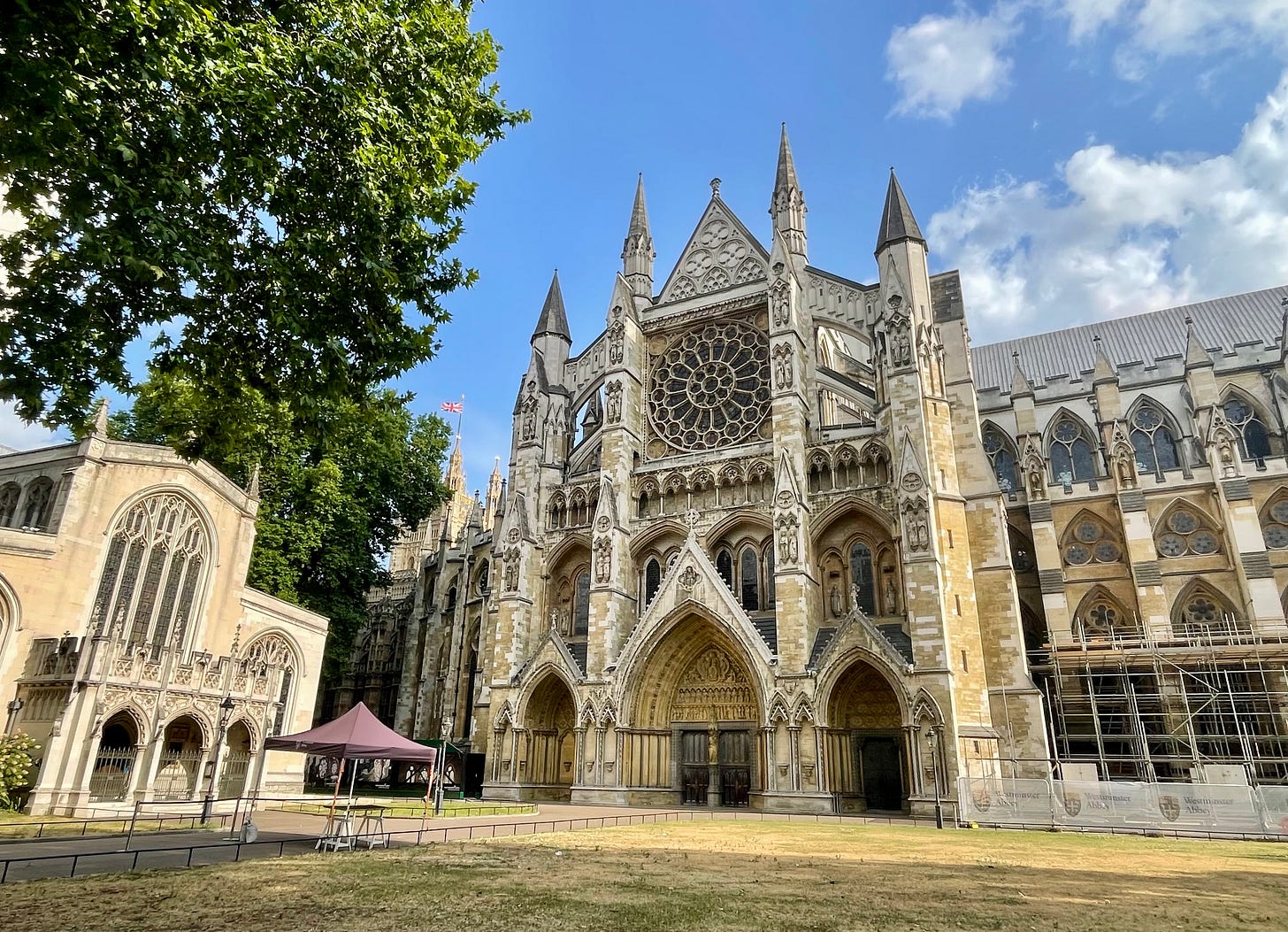
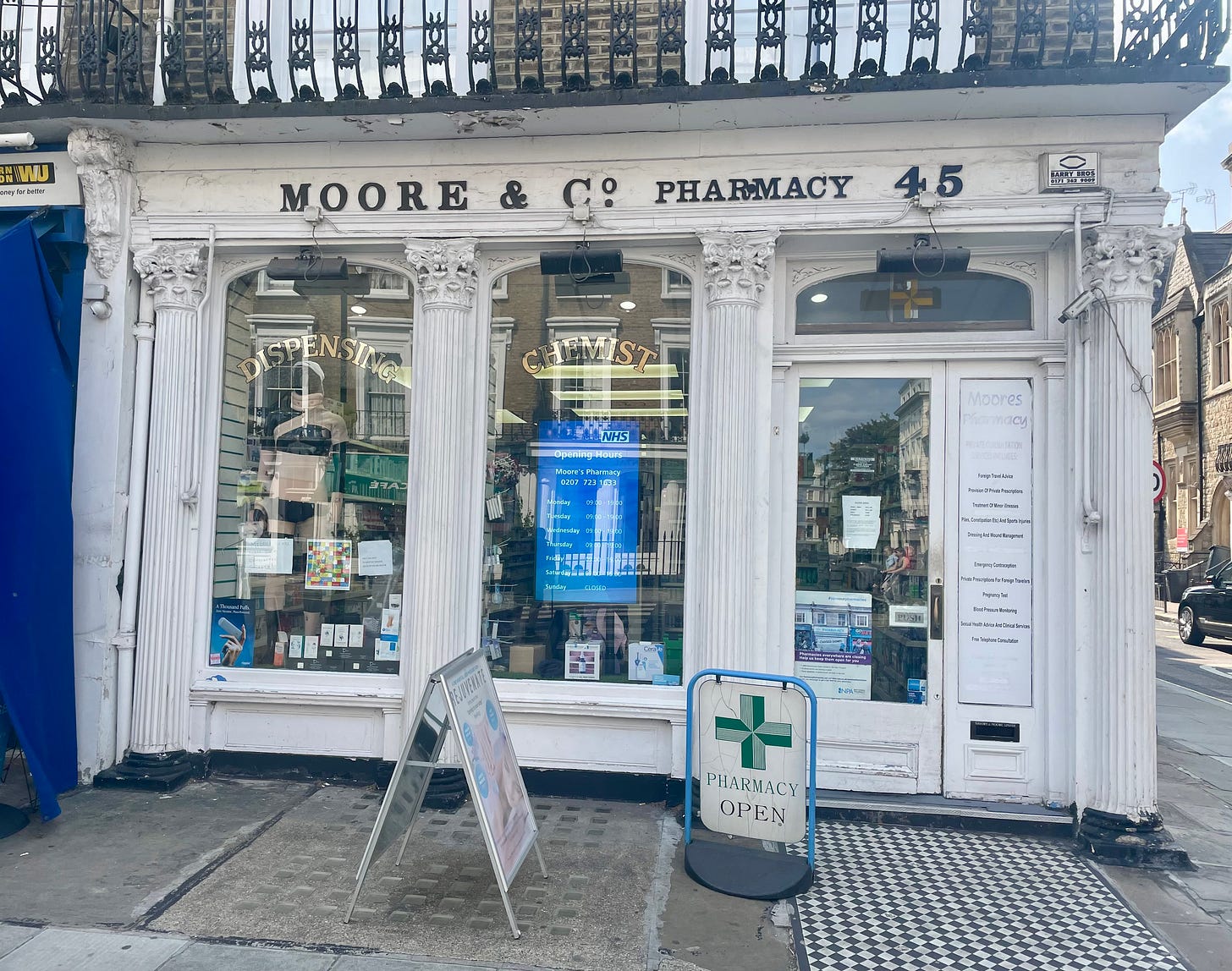
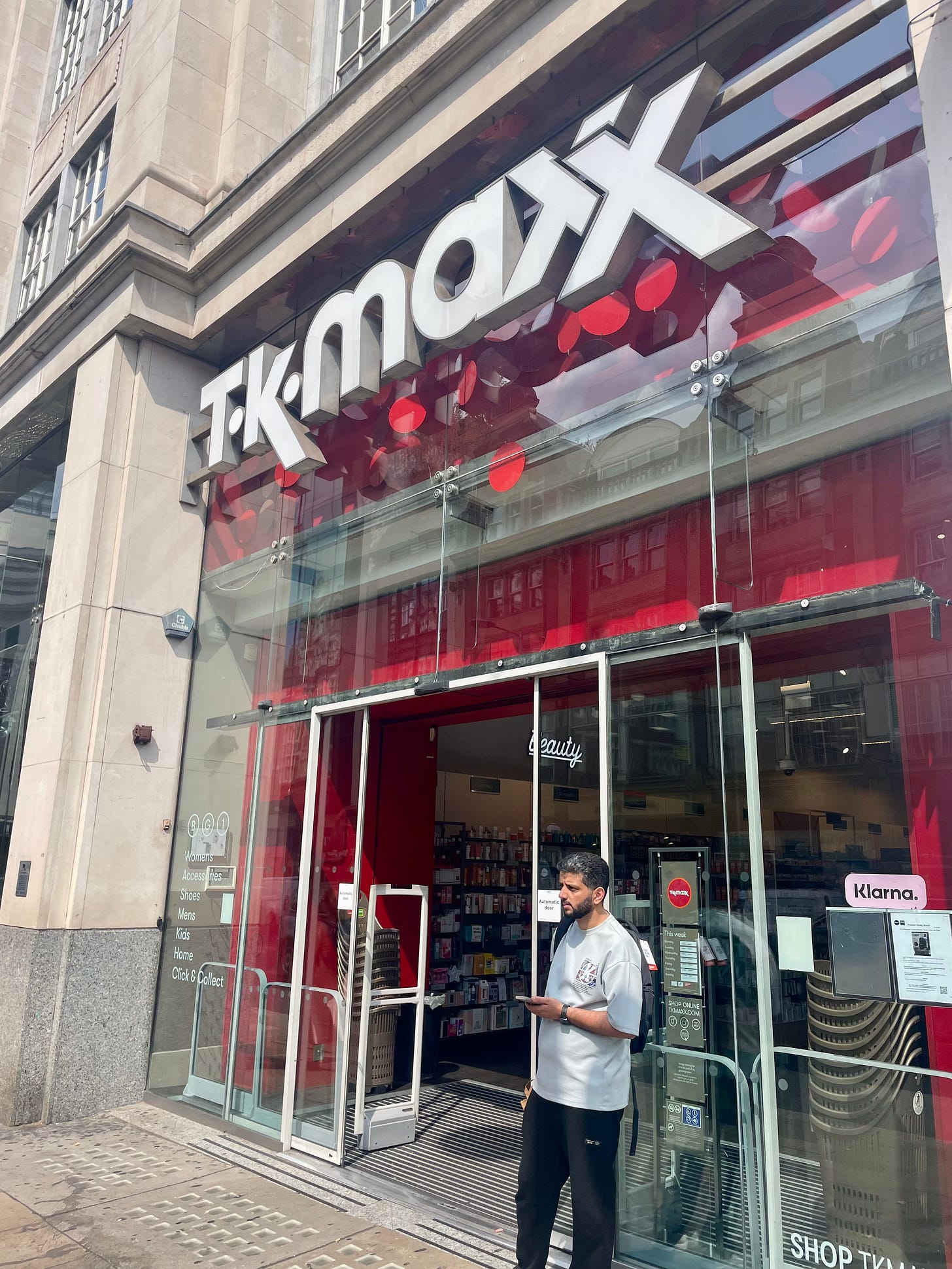
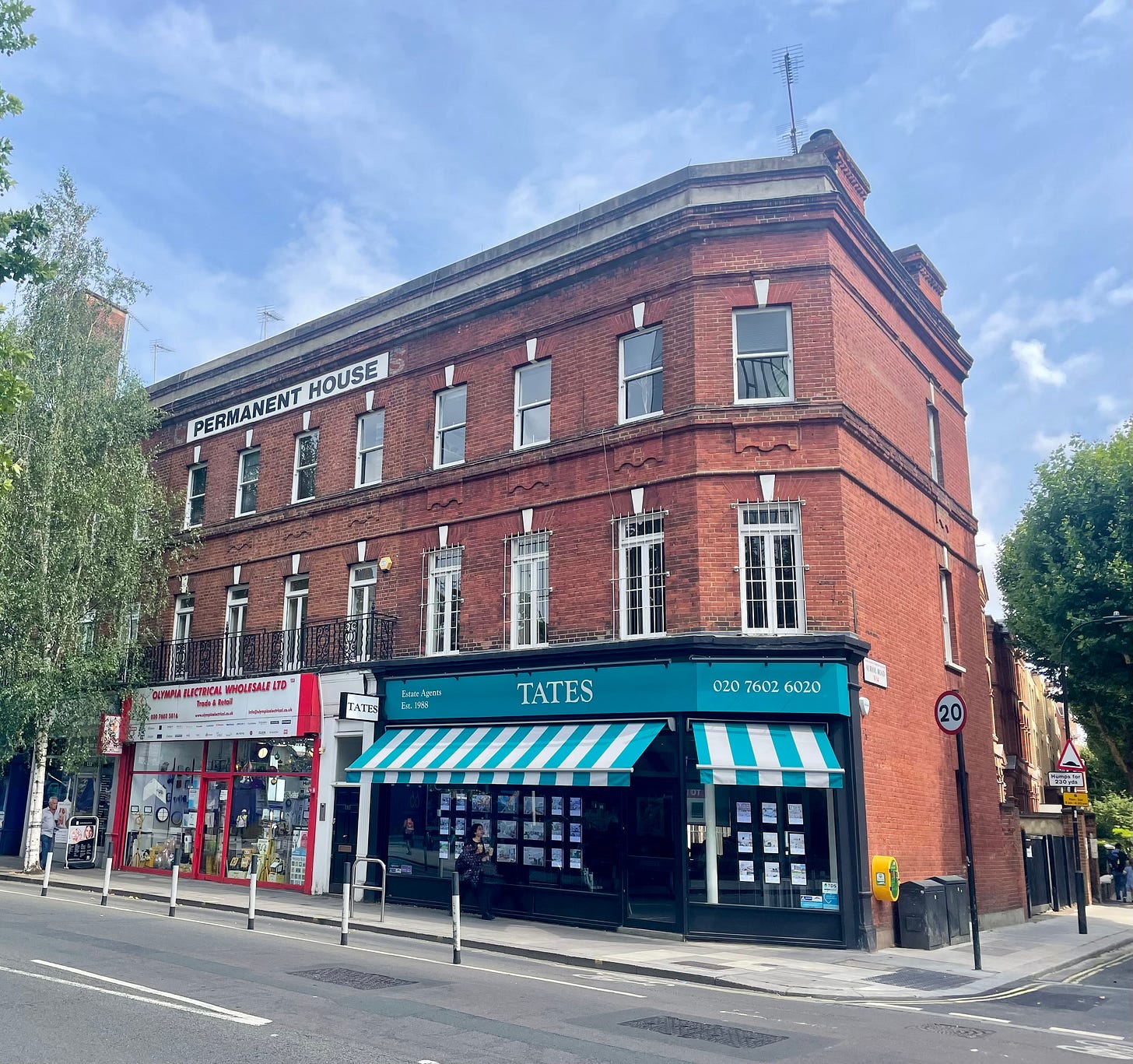
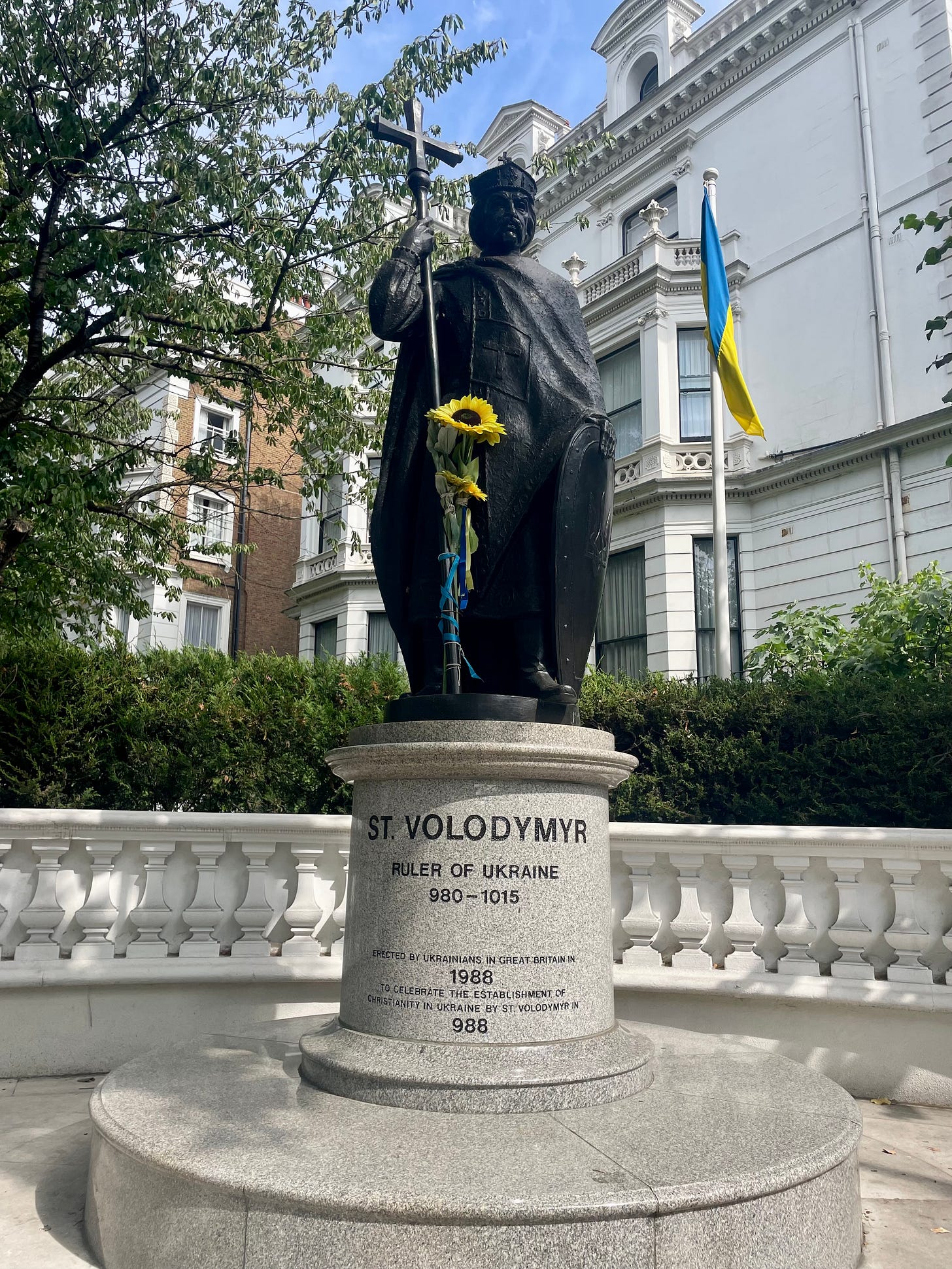
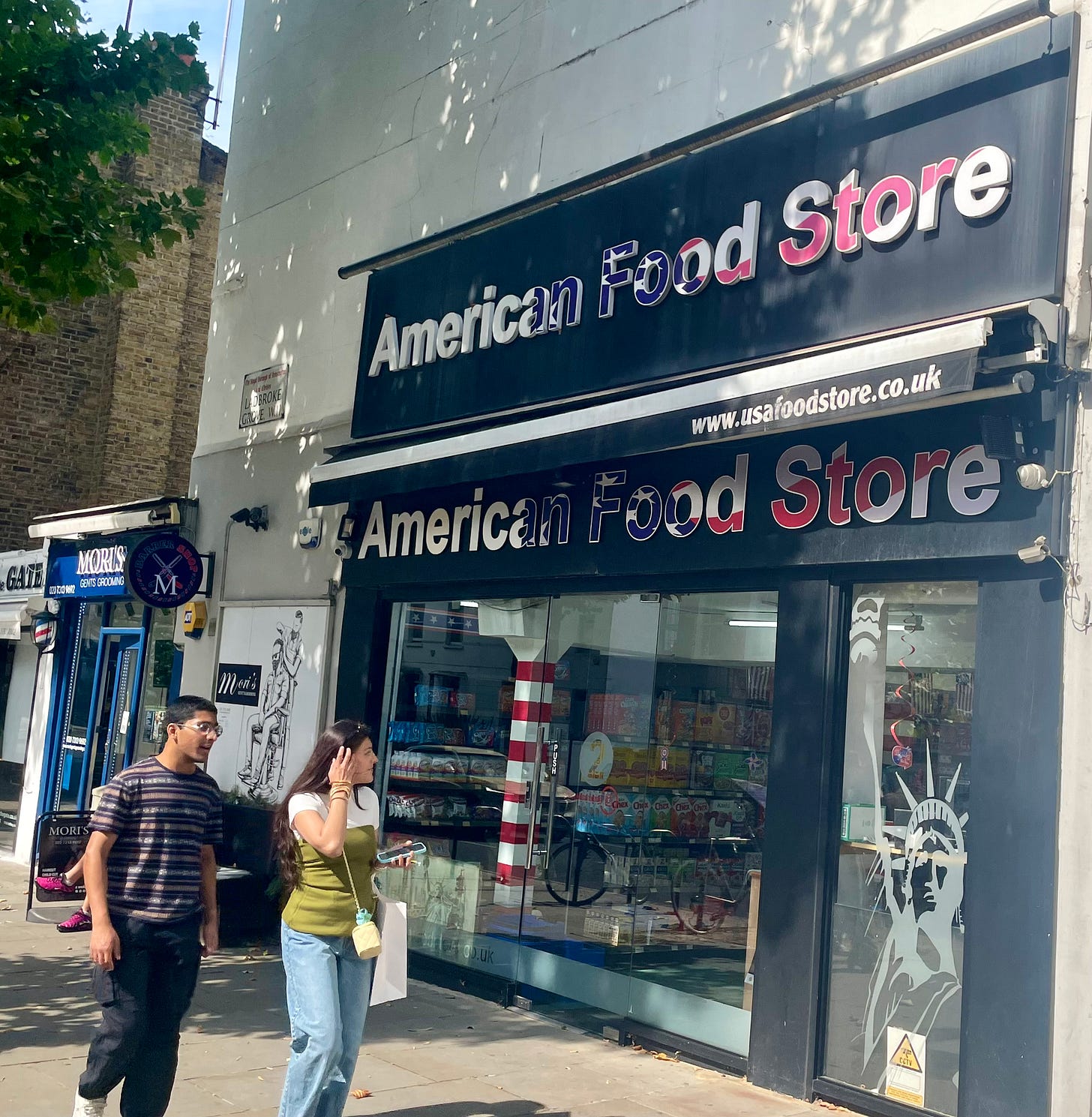
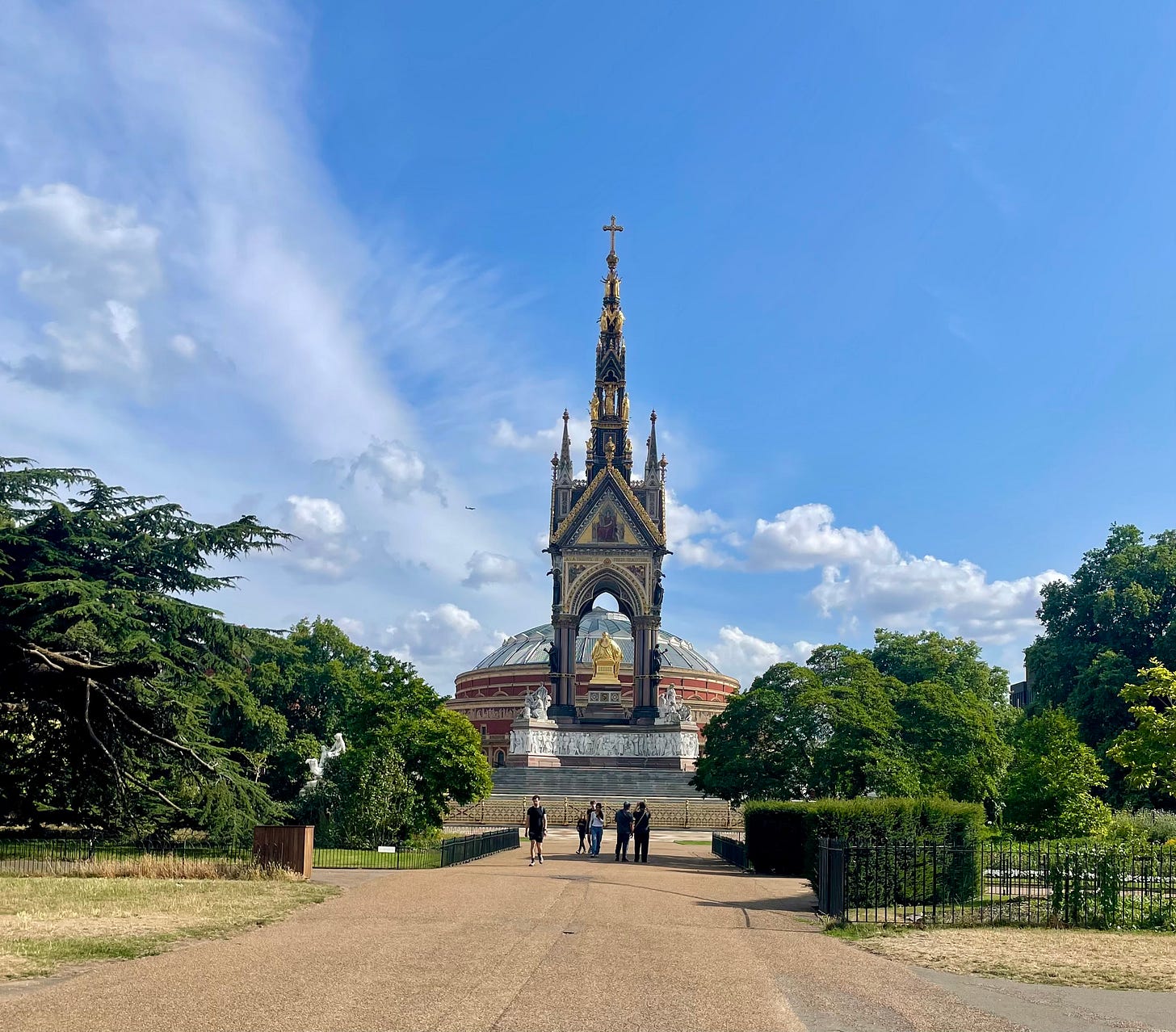
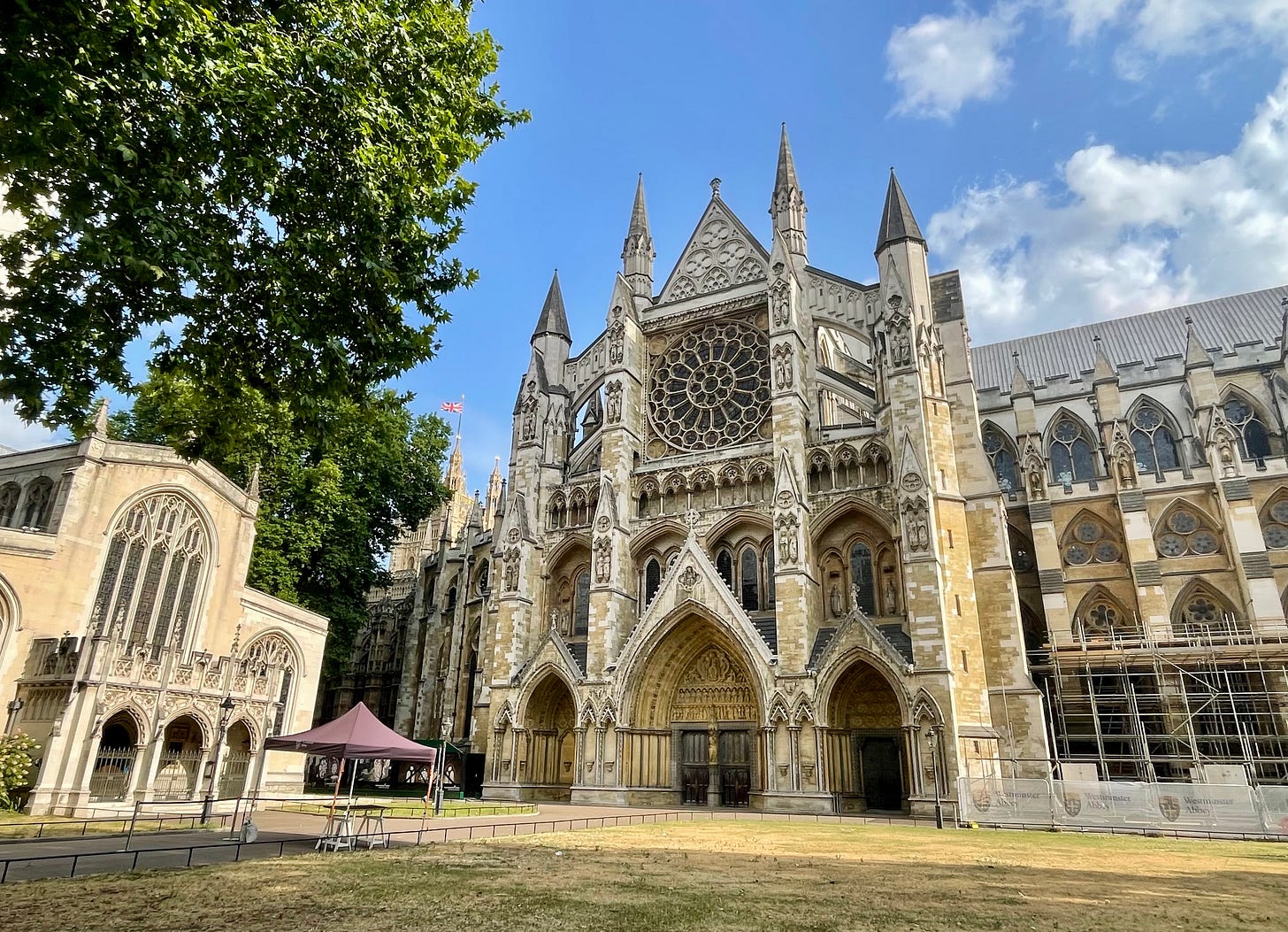
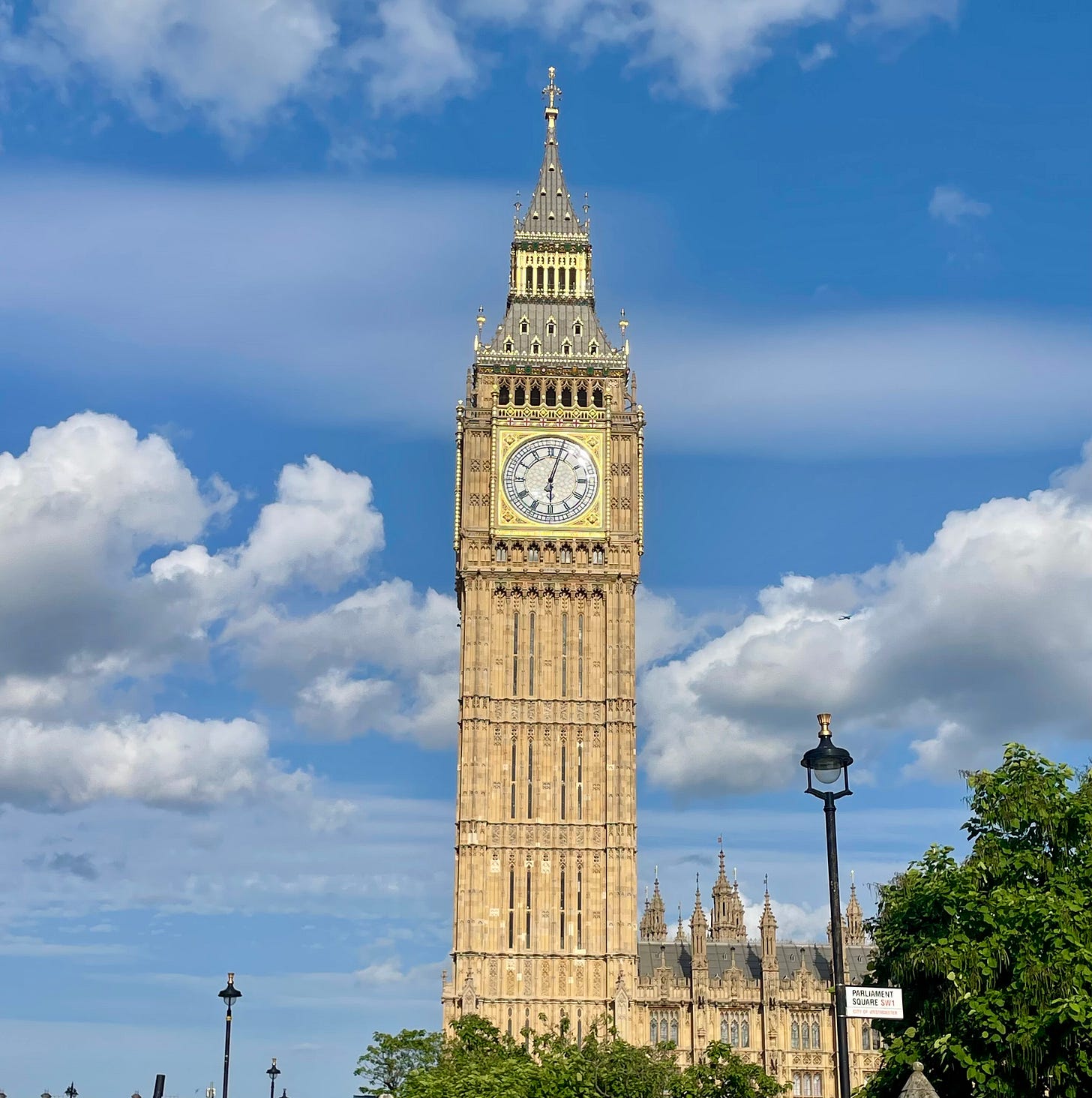
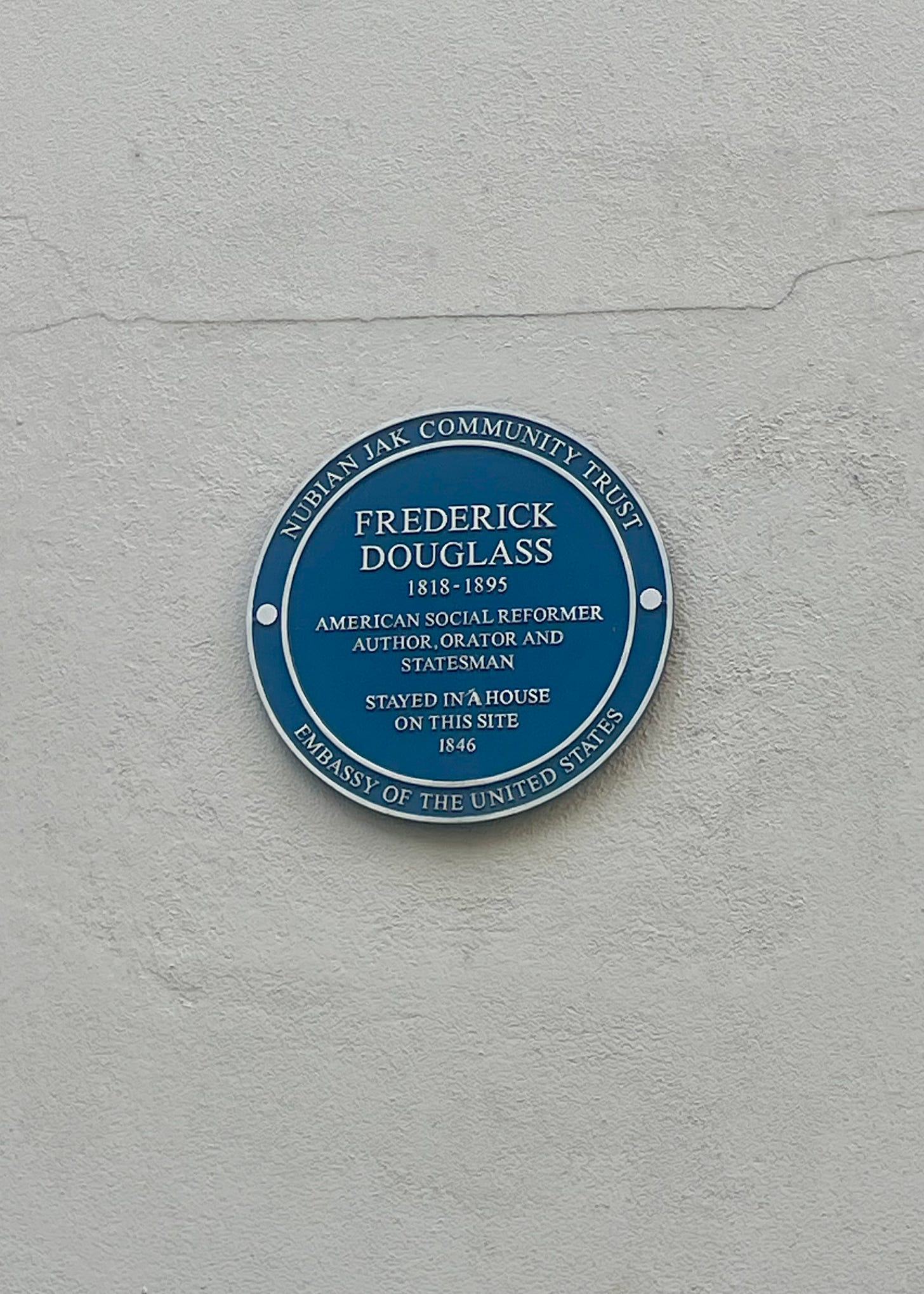
We have a South African Food Shop here in suburban Boring, east of Charlotte. It's been in business as long as I've lived here, more than 20 years, so there must be that much of a market for South African Food.
In novels, they call the English pharmacist a "chemist," as it says on the window in Mr. Nordlinger's photo, and the business a "chemist's shop." Is it new to call the business a "pharmacy," or are the novels just being quaint? They also call the pharmacist a "chemist" in Mexico.
Well, I didn't read the great 'What to the Slave Is the Fourth of July?' address on the 4th, but as the day approached it happened that I reached the chapter 'By the Rivers of Babylon' in David Blight's wonderful biography, Frederick Douglass: Prophet of Freedom, which includes an account of the famous speech delivered on July 5, 1852 (the Fourth fell on a Sunday), before almost 600 white Northerners who gave him an ovation with “a universal burst of applause.” Quoting from a letter I wrote to a friend on the 4th, as Congress passed the OBBB: He was able through his language and other gifts of oratory to afflict the comfortable who knew they were complicit in a great moral wrong. Now, 173 years later, no language, no oratory, no argument could convince even one of 50 senators nor even two or three of 218 representatives that they were not just complicit in but authors of, not so great a moral harm as slavery, certainly, but one that many more than one Senator or three Representatives absolutely knew was wrong in so many ways. Whether they feared for their physical safety (Murkowski signaled as much awhile back) or, more likely, for their political demise in a primary election, their cowardice is contemptible.